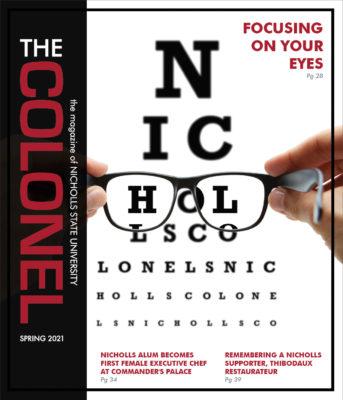Improving How We Exercise
While on a run, cycling or in the pool, Benjamin Boudreaux (BIS ’15) is able to build focus. That clarity carries him throughout the day as he teaches, performs research and writes his dissertation for his doctoral program.
Boudreaux is just a year away from earning his doctorate from the University of Georgia. And by the statistics, he shouldn’t be there.
That’s because Boudreaux has autism. According to Autism Speaks numbers, approximately 50,000 Americans with autism enter adulthood each year, and only one third enroll in college.
The A.J. Drexel Autism Institute tracked college students with autism and only 20 percent were even on track to graduate within 5 years. Only 39 percent graduate within 8 years. Earning a master’s or doctorate is a mountain few on the autism spectrum climb, but Boudreaux has persevered.
“If a person has autism, I believe exercise can help make them more successful,” he says. “Developing a routine with exercise is how I maintain healthy behaviors. I think it helps keep my mental state the same so I can operate and communicate properly, and be social.”
That road toward the successful routine started at Nicholls. After high school, the Metairie native’s parents were worried about sending him off to college. Then, as a family, they found the Louisiana Center for Dyslexia and Related Learning Disorders on campus.
“It helped me start recognizing, what are your problems, what are your strengths, what are your weaknesses,” he says. “So, I started noticing that and that helped a lot. I’m learning how to control what works and what doesn’t work.”
Karen Chauvin with the Louisiana Center for Dyslexia and Related Learning Disorders credits Boudreaux, as well as her staff.
“What I do remember about Ben is that he never stopped working hard and always maintained a positive attitude in spite of seemingly insurmountable obstacles,” she says.
“Developing a routine with exercise is how I maintain healthy behaviors. I think it helps keep my mental state the same so I can operate and communicate properly, and be social.” – Benjamin Boudreaux

While he says he was not very social during his time here, Nicholls and the dyslexia center did lay the foundation for him, socially. As a person on the spectrum, he says social cues can be tough, but he has been able to learn more about himself,
and he says that’s helped him becoming more social at Georgia. He also has a great way to open conversations.
“One of my biggest ice breakers is that I come from Nicholls, you know, that school that almost beat Georgia,” Boudreaux says, laughing.
Exercise is such a big part of Boudreaux’s life that he’s making an academic career of it.
While working on his master’s, he looked into how accurately different wearable devices tracked heart rate and calories. That research was published in the journal Medicine & Science in Sports & Exercise.
At Georgia, his research has included:
Working to see if Fitbit devices would encourage children to be more active in Atlanta area YMCA after school programs
If the wearable device prompts get people to be more active
And his dissertation is looking into the relationship between the 24 hour activity cycle (consisting of physical activity, sedentary behavior, and sleep) and smartphone screen time for UGA students.
That research is continuing into a current project that is personal. He is working with Exercise Connection to study how exercise can help people with autism.
As he pursues a dream of completing his doctorate and becoming a research professor, Nicholls will always have a special place in his heart. It’s where he learned to be successful, and as his career develops, he hopes his research can help others on the autism spectrum reach their own personal goals. – Cain Madden



